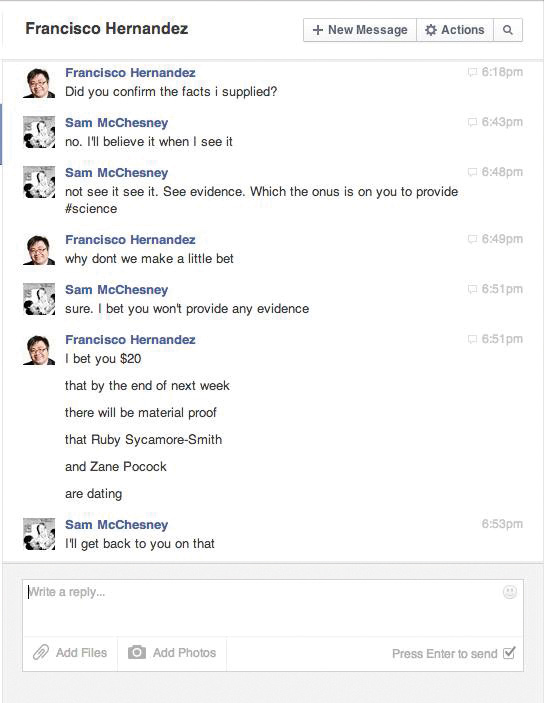The meeting began with some good old-fashioned OUSA scandal. OUSA President Ruby Sycamore-Smith announced that she had entered into a relationship with Critic Editor Zane Pocock. As it is Critic's responsibility to hold Ruby and OUSA accountable to students, action had to be taken to address the obvious conflict of interest. Zane has stepped back from having editorial rights over Critic content that covers OUSA’s activities, handing the task to the News Editor. The issue was discussed after Critic staff were asked to leave the room, so when it was officially announced in the meeting, no comment was made by any Executive members. Ruby also declared that she would no longer be chairing the meetings of Planet Media Dunedin Limited (a wholly-owned subsidiary of OUSA under which Critic falls) due to the conflict but would remain on the board whilst Admin VP Ryan Edgar took over. Planet Media holds direct governance over the Critic Editor’s management, so it is also a conflict of interest for Ruby to chair the board.
Ryan then discussed changes to the Elections Policy. There are conflicting statements with the internal policy and the constitution in that “one policy says we must have an abstain option, the other says we don’t have to and another says do whatever.” Section 5.6 was removed from the elections policy, which states there must be “an option to abstain from voting” until the constitution could be amended. The second edit was to correct a typo in 9.14 of the Elections Policy from “no” to “not,” so it was not “not” anymore.
The third edit was made to section 9.8, which states that candidates cannot campaign in “a manner that implies endorsement by OUSA.” Any Executive member outwardly supporting a candidate must make it clear that they are “acting as an individual, outside of their official OUSA capacity.” Any campaign materials involving the Executive member, including social media posts, must also clearly display a disclaimer that their support is “in no way an endorsement by OUSA.”
Ruby concluded the policy talk pointing out that the Executive should thoroughly read the policy and “if there is something that sticks out like a sore thumb, say something so we can turn it into a positive thumb.”
OUSA General Manager Darel Hall had his operations report passed. He outlined that a recent survey revealed that students do not use the student handbook diary and its future was being considered, but that the wall-planner and Critic magazine were widely used.
Darel is also focussing on health and safety standards, with a focus on earthquake safety measures. The squash building is back to a satisfactory level in regards to building standards.
OUSA Finance Officer Paul Hunt discussed whether there should be a committee for religious groups. There was a lack of input from most of the Executive but Paul observed, “Religious and country groups are more where you go along and hang out together rather than doing stuff.” Recreation Officer Henri Faulkner then talked about religion, or something along those lines – Critic was unable to decipher the many words that were said and the rest of the Executive looked equally confused. No decision was made and Ruby, clearly irritated by the complete lack of constructive input from anyone, said “it would be good to put a piece of paper in the agenda so we have some context. So the discussion can be constructive.”
Welfare Officer Payal Ramritu then addressed her five items on the agenda. On her mission to make OUSA Executive members more accountable, she asked Critic how this may be achieved through the publication. Critic responded that they simply needed contentious issues to be openly discussed in Executive meetings. The discussion then returned to talk of timesheets and Ruby quickly pointed out that there was strong objection to the idea when she suggested it at the start of the first semester. Ryan commented, “I don’t care anymore.” The only agreement was that the Executive would return to giving a round-up of their progress at the end of each meeting.
Expecting some pressing issues on accountability to be addressed, Payal then discussed microwaves and the free breakfasts offered to students. She requested more microwaves, saying “the average wait time is 7.5 minutes” and most were either unavailable outside of business hours or broken. She also requested peanut butter, marmite and marmalade for the free breakfasts held at Student Support. The Executive agreed this would be looked into as Ryan pointed out the request was “pretty unsubstantial and uncontroversial.” Critic notes it got pretty substantial and controversial once raisins were discussed.
“We want more raisins,” Payal said, “Can we just have more raisins?”
“How many do they get?” asked Darel.
“They get about three and want eight.”
“But that’s a 300 per cent increase. What about four raisins?” asked Darel. He agreed to look into the issue soon.
The meeting finished with a round up of what each Executive member had recently achieved. This consisted of nothing interesting and is available at the end of the Executive minutes on the OUSA website. Instead of printing their summaries, the screenshot from a recent conversation between the 2013 OUSA President and the 2013 Critic Editor was much more entertaining.

There was a final comment on accountability, tactfully used by Ruby. She asked the Executive three times to join her on the stage for the upcoming graduation ceremony, finally needing to say, “It’s important to make sure you are seen. It dove tails into accountability.” Payal finally agreed to assist, but no other Executive members volunteered.
Since the meeting, the peanut butter issue has been dealt with. The raisins issue is still to be addressed.




